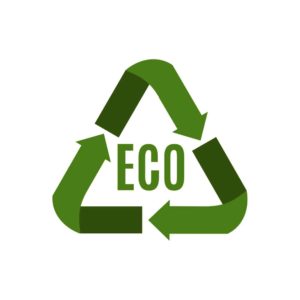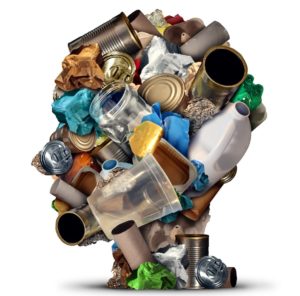As the population of the earth continues to grow, so do the concerns about where our waste will be deposited. And it is no secret that we often fail at managing the mass quantity of waste that our nation is creating on a daily basis. The importance of waste management doesn’t just fall on the shoulders of big companies. As a nation, we are all accountable for the waste that we contribute to landfills. At KC Dumpster Company, it is our mission to provide quality dumpster services and to promote eco-friendly waste management. Whether you are a big, or small business owner or a homeowner, it’s important to understand and be familiar with eco-friendly waste management strategies and how you can help.
What Does It Mean To Be Eco-Friendly?
Being eco-friendly, simply put means to be earth-friendly. Most often it is referring to the use of products that are considered green or practices that conserve our resources such as water and energy. Included in this is the process of recycling resources and disposing of resources in a way that is friendly to our planet.
What Are The Most Common Waste Management Challenges?

The Advantages of Eco-Friendly Waste Management
With proper waste management processes in place, there are a host of benefits. Some of the primary benefits are as follows:
- A safer and cleaner environment with less illness, disease, and pollution.
- Conservation of energy and protection of natural resources such as reducing deforestation
- Reduction of pollution and waste in the environment
- These practices are highly lucrative
The Disadvantages of Implementing Eco-Friendly Waste Management Processes
The implementation of waste management processes can come at a cost, of more than just money. Some of the primary disadvantages are as follows:
- Implementing waste management processes are not always cost-effective
- The resulting product of recycled materials may have a shorter lifespan
- Some processes need global buy-in to work
- Waste management sites can be dangerous
Community Involvement for Eco-Friendly Waste Management

So what can we do as a community to be more eco-friendly and to help save on our natural resources? Let’s take a look at some of the more popular strategies of eco-friendly waste management.
Reduce and Reuse Resources
We are a nation of convenience, and while convenience has its perks it also has its pitfalls. There are many resources available that can be reused to prevent them from ending up in a landfill or using additional resources. Although there are times that reuse is not an option, there are plenty of opportunities where we can reuse items instead of throwing them away. Below are a few ideas to get you started
- Look for products that use minimal packaging. Less packaging used by companies for packaging means less raw materials that have to be used and potential savings for the consumer.
- Buy used before you buy new. You can find some amazing deals on gently used items including everything from building materials such as cabinets, clothing, furniture and so much more! While you’re at it, be sure to donate items you no longer use or want. Donate gently used to your local community services league. Not only are you reusing you are helping others in your community.
- Instead of buying new items, be sure to maintain or repair the products you have such as clothes, appliances, and electronics. The better you maintain the less you will need to purchase.
- Purchase reusable items versus disposable items. Instead of buying paper plates for picnics and cookouts, consider going to your local superstore and buying reusable, BPA free, plastic plates. Easy cleanup and no waste on paper products.
- The next time you need a tool or item that you do not own that you will use once or twice, borrow it, don’t buy it. If your friends and family are like mine, they will be happy to lend a hand to help.
- Limit your purchase of products that contain hazardous materials and instead look for alternative products.
Recycle Resources
STOP! Are you going to throw that can in the trash? What about the cardboard boxes from Amazon that your new gadget came in? While it’s easy to throw away anything we don’t want, it’s also easy to recycle it. We have conditioned ourselves to get rid of what we consider waste. And, those things generally end up in a landfill. Before you throw away that soda can, newspaper, or box, consider recycling. The benefits of recycling impacts everyone.
Don’t throw away that paper! Did you know that 25% of the waste that ends up in landfills every year is paper? Put newspapers and magazines in your recycle bin instead of in the trash. Also, try to reuse gift bags or use decorated gift boxes that do not need wrapped. The key is to reuse as often as possible if the product cannot be recycled.
- Glass can be recycled over and over again. And the adoption curve for recycling glass is much higher than many other products but is still only around 26% each year. The wonderful thing about glass is that it is much cheaper to make new glass from recycled glass which saves money and reduces the number of raw materials that we use.
- Over 35 million tons of plastic are created every year in the United States. Unfortunately, less than 10% of plastic is recycled each year. Plastic, depending on the type, can be recycled, however, be sure to check the container before putting it in the recycling bin.
- When getting rid of batteries, do not throw them in the trash. I know, it’s second nature to throw out anything that doesn’t work anymore, however, batteries contain chemicals that can be harmful and should be brought to an in-store recycling bit or a community recycling center.
In Closing
While there is no way that we can completely eliminate creating waste, we can mitigate the effects. Take a step forward for yourself and your community and give eco-friendly waste management a try. KC Dumpster proudly supports recycling and the Lees Summit Resource Recovery Park Recycling Center. Stop by to drop off your recycling and say hello. And the next time you have a big project and need a dumpster, you can count on us to deliver it when and where you need it.

 Don’t throw away that paper! Did you know that 25% of the waste that ends up in landfills every year is paper? Put newspapers and magazines in your recycle bin instead of in the trash. Also, try to reuse gift bags or use decorated gift boxes that do not need wrapped. The key is to reuse as often as possible if the product cannot be recycled.
Don’t throw away that paper! Did you know that 25% of the waste that ends up in landfills every year is paper? Put newspapers and magazines in your recycle bin instead of in the trash. Also, try to reuse gift bags or use decorated gift boxes that do not need wrapped. The key is to reuse as often as possible if the product cannot be recycled.
Leave A Comment